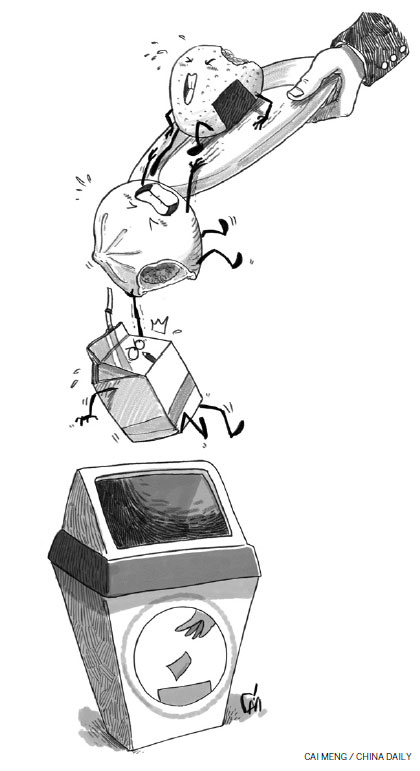Reducing waste can boost food security
During the period of its 13th Five-Year Plan (2016-20), China intends to pursue a new development mode that will be "higher in quality, more efficient, fairer and more sustainable". Agriculture will be fundamental to this, given its significance to both food and environmental security.
China produces about three-fourths of the combined total value of production of all Organization of Economic Cooperation and Development countries. Globally, it is the largest producer of products such as potatoes, wheat, tomatoes, rice and apples. Its own agricultural products are supplemented by imports of agro-food products from all over the world to ensure food security.
But food security not only means enough food is available, but also the food that is available is not over-consumed or wasted. At present, industrialized Asia (China, Japan and South Korea) contributes 28 percent of the total food wasted in the world, which is estimated at 1.3 billion tons per year.
For industrialized Asia, three stages of the supply chain need special attention: postharvest handling and storage, distribution and consumption. The handling and storage stage of the supply chain accounts for 20 percent of the food wasted in the region, another 14 percent of food is lost at the distribution stage, while some 31 percent is wasted during the consumption stage, which is the third highest globally.
That vegetable losses in industrialized Asia account for about 11 percent of global food losses is of special concern, as this region accounts for more than 50 percent of global production and consumption.
According to the OECD, perishable food such as fruits and vegetables show high postharvest losses in China, estimated at 15 percent and 10 percent of food wasted nationally respectively. This, and the fact that only a small percentage of fruits and vegetables are processed, contributes to the high losses. However, statistics are not always very reliable. For example, for potatoes, some studies indicate that the postharvest physical waste is 20 percent, while others claim only 7 percent, a huge difference.
Geographically, there are higher postharvest losses in north China compared with the south. According to a survey by the State Administration of Grain, the average household grain storage losses in northeastern provinces are 10.2 percent, in northwestern provinces they are 8.8 percent, in the middle and lower reaches of the Yangtze River they are 7.4 percent, and in the Yellow River-Huaihe-Haihe Plain they are 5 percent. This difference can be explained by many factors, including climatic conditions and planting practices. More cold storage and better road infrastructure will reduce postharvest losses over time.
Meanwhile, with the increasing affluence of Chinese consumers, food waste at the consumption stage is steadily increasing. However, the majority of food waste at this stage occurs in restaurants, not by households, unlike in the developed world. In the catering and restaurant sectors, 10 percent of food is wasted on average. Many times, over-ordering, regarded as a sign of respect and generosity to guests, leads to unnecessary food waste.
The Chinese leadership has placed a high priority on food security. Its achievement can be significantly assisted by progressively ensuring that the food that is produced and imported is actually eaten and not wasted. China does not have much land and water to increase its food production significantly. Therefore, a comprehensive framework that reduces food waste and ensures food security will be beneficial over the long term for China and the world.
Cecilia Tortajada is senior research fellow at the Institute of Water Policy, Lee Kuan Yew School of Public Policy, National University of Singapore. Matthew J. Kastner is a graduate student at the same University. Asit K. Biswas is a distinguished visiting professor at the above School.



















